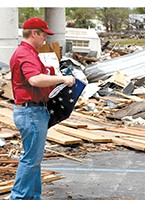Self-Care in the Aftermath of Crisis
April 01, 2019
Learning to deal with ‘the best and the worst of myself’ following a killer tornado in his school system.

Sunday, May 22, 2011, began as another Missouri morning that typified the natural beauty of living in the Ozarks. I woke up that day with great anticipation. This was the day I, as the district superintendent, would have the honor of shaking the hands of nearly 500 graduating Joplin High School seniors upon receiving their diplomas. It was graduation day and a day of celebration.
Graduation ceremonies began promptly at 3 p.m. The school band played, our seniors gave great speeches, diplomas were granted and family photos were taken amid lots of laughter and tears. The last diploma was handed out just a few minutes before 5 p.m. Right on time. It was a perfect day.
At 5:17 p.m., I walked out of the gymnasium at Missouri Southern State University to the sound of tornado sirens. By 6:13, our community had lost the lives of 161 friends and neighbors, including one of the seniors who had just graduated, six other students and a school staff member. Six of my 19 schools had been destroyed by a devastating Category EF5 tornado. Three other buildings sustained damage, and our central office was unusable. What had started as a day of great celebration had ended in panic, fear, uncertainty and mourning.
The Healing Begins
It has been almost eight years since the costliest tornado in U.S. history ripped through the heart of Joplin. Although much of what physically was destroyed has been rebuilt, the emotional scars cut deep. Construction may be complete, but the healing continues.
In 2015, at 45 years old, I reluctantly “retired” as Joplin’s superintendent. The time had come. I was physically and emotionally exhausted after four years of a complicated recovery effort and the politics that came with it. Throughout the process of overcoming many challenges, I saw the best and the worst of people. I also saw the best and the worst of myself.
One of the most personally meaningful quotes I have ever read is by novelist Arthur Golden, author of Memoirs of a Geisha. He says, “Adversity is like a strong wind. It tears away from us all but the things that cannot be torn so that we see ourselves as we really are.” I do not think there are truer words that have ever been written.
When I left the superintendency four years ago, I ran as fast as I could away from anything related to disasters and recovery. I wanted to have nothing to do with that kind of work ever again. I fought it hard, but the harder I fought the more I struggled. As is often the case, God had a different plan for me than what I had for myself. I finally gave in and found peace. That is when my healing began.

Shared Experiences
Since I started on this new path as a consultant to others on disaster response, recovery and resilience, I have been blessed to spend quality time with many good people — amazing education leaders who, like me, found themselves on the front
line of a battle they didn’t sign up to fight. These were battles that had nothing to do with curriculum, instruction, teaching and learning.
In my new role, I continue to learn from leaders across the country who have faced adversity. I’ve learned from Frank DeAngelis and his experience as the principal at Columbine High School in April 1999; Janet Robinson and the terrible tragedy in Newtown, Conn., where she was the superintendent in December 2012; Robert Romines, superintendent in Moore, Okla., where seven children died at an elementary school during an EF5 tornado in May 2013; and school leaders in Texas and Puerto Rico impacted by Hurricanes Harvey and Maria, respectively. The list goes on.
Although every disaster is unique in its own way, the leaders charged with responding share common experiences. My prayer is that you learn from the lessons your colleagues have learned the hard way, reflect on those lessons and take action to better prepare yourself for whatever unforeseen challenges tomorrow may hold.
Three Lessons
The three most valuable lessons from our collective experiences are these.
1. SELF CARE. When was the last time you went to the doctor for a checkup? Are you exercising on a regular basis? Have you found balance between your work and personal life? How are you taking care of your spiritual self?
These sound like questions you may hear from a life coach, yet they are questions you should take seriously. After all, there is a logical reason the flight attendant instructs us, “In case of emergency, put on your oxygen mask first before helping others.”
Following our disaster in Joplin, my personal failures are too numerous to mention. I quit exercising, stopped going to church and began neglecting my family. In my mind, there was too much to do to slow down to refill my cup by spending time doing things that weren’t disaster-related. I replaced what little quality time I had under normal circumstances with work habits that were unsustainable. My team, some of the most caring, child-centered educators I have ever known, followed my lead. I was their leader. I set the pace. It was not sustainable.
As a consequence of these work habits, my physical and emotional health declined. I considered four hours of sleep a good night’s sleep. I found comfort in food and gained a lot of weight quickly. This led to a battery of other health issues, the least of which included severe sleep apnea. A more serious concern was my silent struggle with bulimia that began in fall 2011. It’s a disease I successfully hid for almost five years. I am convinced that had it not been for my dedicated wife, my loving family, my true friends and my faith in God, I would not have made it.
The lesson here is to develop healthy habits now and prepare to maintain those habits through the course of a crisis. The people who follow you need to see that behavior modeled for them. That takes self-discipline and the strongest kind of leadership. You and your people will be better for it.
2. VISION. No leadership concept receives more attention in the literature than the importance of articulating a clear and compelling vision. This becomes especially true following tragedy.
When a major disaster strikes, the greatest threat to a successful response and recovery is standing still. The crux of crisis leadership resides in our ability to respond quickly when tragedy and emotion collide. At that moment, you and the people around you are trapped in a nightmare desperately searching for a path forward. Your responsibility as the leader is to chart the course.
The bottom line is that casting a clear and compelling vision still matters. In Joplin, it was as simple as clearly stating that we were going to do right for our kids by getting our schools open for the new school year on Aug. 17, 2011 — three
months after the tornado struck. Our community and the volunteers who were pouring into Joplin bought into that vision, and together we did it. The “how” behind that vision was challenging, but we figured it out collaboratively day
by day. It was the vision that provided the hope and drove the actions necessary to guide us forward.

3. RELATIONSHIPS. We all understand the importance of building and maintaining healthy relationships in our work and personal lives. Frankly, during the times we are most challenged, it will be those relationships that will carry the day. The support from your family, friends and team will be unwavering. But the pre-need relationships with your staff, the relationships with your community and your relationships with peers matter as well.
After our disaster, it was the relationships and systems already in place that supported our response and recovery effort. We knew how to manage donations, coordinate volunteers and communicate with our stakeholders throughout the response and recovery.
This was important. But even more important was the depth of those community relationships — especially those with key leaders who could support our recovery in the short term. The president of the Joplin Area Chamber of Commerce was able to provide immediate assistance in locating facilities to house more than 3,000 students who no longer had a school to attend. The CEO of the local electric company was able to use his influence to direct utility workers to get power to schools when we needed it most.
Many others stepped up as well. When I called, they knew me and knew my heart. They understood the importance of the request and they made things happen. We weren’t exchanging business cards at the Emergency Operations Center. We already knew each other.
And then there were my peers from around the state and nation who cared enough to reach out. People like Darin Headrick, who was the superintendent of schools in Greensburg, Kan., who had lost his entire community to a tornado in May 2007. He was in my district within the week to offer his experience to me and my school board. Phil Cook, superintendent of Carl Junction, Mo., kept tabs on me regularly. Ron Lankford, a retired superintendent who was a leader at the Missouri Department of Education, seemed to make timely calls when I was struggling the most. Brad Swofford, superintendent in Branson, Mo., made the trip over to Joplin after a call from my wife, Jennifer. She had alerted him that her husband needed to spend some time on the back porch with a friend.
Your peers will be there for you. Don’t be ashamed or embarrassed to ask for or accept help.
Winston Churchill said it best: “When you are going through hell, keep going.” You can ask any leader who has had to lead through a crisis. They will share that your leadership will be tested like never before. But when times get tough, simply remember that before, during and after a disaster, vision still matters, relationships still matter and taking care of yourself will help you best help others when they need you most.
About the Author
C.J. Huff is based in Joplin, MO and is a former superintendent, consultant, and public speaker on leadership issues.
Advertisement
Advertisement
Advertisement
Advertisement



